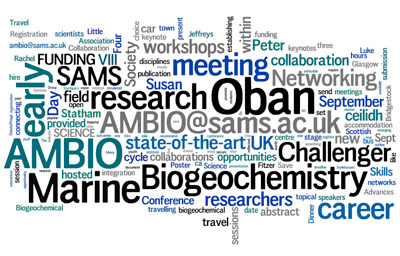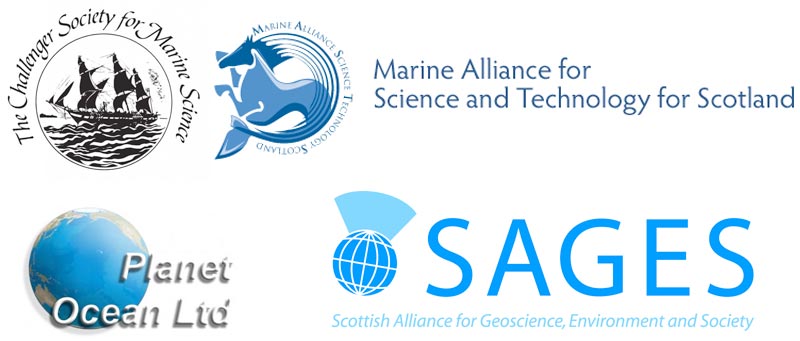Advances in Marine Biogeochemistry Conference VIII
 We are pleased to invite you to the Advances in Marine Biogeochemistry (AMBIO) VIII Conference hosted by SAMS from 6 to 8 September 2017.
We are pleased to invite you to the Advances in Marine Biogeochemistry (AMBIO) VIII Conference hosted by SAMS from 6 to 8 September 2017.
This is the biennial meeting of the Challenger Society's Marine Biogeochemistry Forum. It attracts early career researchers from institutions across the UK, and provides a fantastic opportunity for networking and forming new collaborations.
The conference aims to present the state-of-the-art in research and technology in the field of marine biogeochemistry in the UK.
Day 1 will cover currently emerging and highly topical aspects of research, with a line-up of exciting keynote speakers.
Day 2 will be dedicated to celebrating Peter Statham’s career, with notable keynote speakers reflecting the highlights and diversity of his research interests.
The organisation of topical workshops on Day 3 will provide the opportunity to focus on subject-specific collaborations to target funding and research outputs.
We are grateful to the conference funders

Please download:
AMBIO 8 conference delegate information
Tuesday 5 Sept 2017
18.30 Informal icebreaker in Oban, Corryvreckan Pub (Wetherspoons near CalMac Ferry Terminal)
Wednesday 6 Sept 2017: Day 1
08.30 Registration and coffee
09.30 Welcome from Prof Nick Owens
Session 1: Biomineralisation
09.45 Keynote
- >Susan Fitzer, University of Glasgow: An understanding of biomineralisation pathways is key to predict climate change impact on aquaculture
10.15 Phoebe Stewart-Sinclair: Vulnerability to climate change: exposure, sensitivity and adaptive capacity of molluscan shellfish aquaculture
10.30 Kyle Mayers: Seasonality of Coccolithophore populations and calcification rates within a temperate shelf sea system (Celtic Sea)
10.45 All poster presenters: Research highlights of each poster (60 sec per poster) - see poster tab for details
11.00 Tea and coffee
Session 2: Deep Sea
11.30 Keynote
- >Rachel Jeffreys, University of Liverpool: Shifts in deep-sea food webs linked to climate and food supply
12.00 Anna Belcher: Deep transfer of copepod faecal pellts in the Southern Ocean in spring: the role of deep zooplankton communities
12.15 Emma Cavan: Increased warming reduces carbon export in the Southern Ocean
12.30 Jirina Stehlikova: Hadal trenches: evidence for particulate matter dynamics on short time scales
12.45 Robert Turnewitsch: New insights into abyssal hill biogeochemistry
13.00 Lunch
13.30 Challenger AGM (Meeting Room 1)
Session 3: 'Lab-on-chip' in situ sensors
14.15 Geraldine Clinton-Bailey: 'Lab-on-chip' sensors for in situ determination of macronutrients in natural waters
14.30 Alexander Vincent: A seasonal comparison of high-resolution nitrate fluxes into the euphotic zone in the Celtic shelf sea, using lab-on-chip nutrient and microstructure sensors deployed on gliders
14.45 Jonathan McQuillan: Next generation sensors for marine microbiology using lab on a chip
15.00 Julie Robidart: What microbes can tell us about nutrient mixing in the open ocean
15.15 Adrian Nightingale: In situ sensors based on droplet microfluidics
15:30 Tea and coffee
Session 4: Global nutrient and carbon cycling
16:00 Keynote
- >Susan Little, Imperial College London: Coupling and decoupling of Zn and Si in the global ocean
16.30 Yingxu Wu: The impact of upwelling on the DIC-temperature relationship in the surface global ocean
16.45 Toby Tyrrell: Comparison of latitudinal distributions of macronutrients, alkalinity and carbon
17.00 Vlad Macovei: Temporal variability in the biogeochemistry of the surface North Atlantic - more than a decade of Ship of Opportunity data
17.15 Poster and drinks reception
Thu 7 Sept 2017: Day 2 A celebration of Peter Statham’s career
09.30 Jacqueline Tweddle: From marine biogeochemistry to marine management and policy, and back again.
Session 5: Organic carbon
09.45 Keynote
- >Luke Bridgestock, University of Oxford: Isotopic insights into the marine biogeochemical barium cycle
10.15 John Aldridge: Lessons learned from modelling SSB benthic obervations in the Celtic Sea
10.30 Steph Allen: Composition and size structure of plankton communities across the North Atlantic
10.45 Stacey Felgate: Using dissolved inorganic carbon (DIC) δ13C and Δ14C ratios to characterise organic matter respiration and blue carbon stability within an East Coast US salt marsh
11.00 Tea and coffee
Session 6: Seawater Iron I
11.30 Keynote
- >Peter Statham, National Oceanography Centre: The changing nature of marine biogeochemistry: past, present and future
12.15 Jessica Klar: Stability of dissolved and soluble FE(II) in shelf sediment porewaters and release to an oxic water column
12.30 Alastair Lough: Iron isotopes track the uptake and exchange of iron across an oxic shelf sea
12.45 Amber Annett: Trace metal supply from the western Antarctic Peninsula Shelf to the open ocean
13.00 Lunch
Session 7: Seawater Iron II
14.00 Keynote
- >Martyn Tranter, University of Bristol: Glaciers deliver nutrients to coastal waters?
14.30 Laura Hepburn: Mineralogy of reactive iron species: Combining sequential extractions and Mössbauer spectroscopy
14.45 Deborah Wood: Fe colloids and nanoparticles in aquatic environments: towards a mineralogical understanding
15.00 Saskia Ruhl: Ecological and biogeochemical consequences of bentho-pelagic exchanges in shallow coastal ecosystems
15.15 Antony Birchill: Iron deficient waters over the Hebridean shelf break
15.30 Tea and coffee
16.00 Wenhao Wang: Behaviour of iron isotopes in hydrothermal systems: Beebe and Von Damm vent fields on the Mid-Cayman ultraslow-spreading ridge
16.15 Laura Hepburn: Biogeochemical Mn, Fe and S cycling in Kemp Caldera sediments, south of the Antarctic Polar Front
Finale: High resolution mass spectrometry
16.30 Matthieu Clog: Beyond bulk isotope ratios: looking at clumped and position-specific isotopes in light alkanes
16.45 Prize giving
17.15 Poster and drinks reception
19.00 Conference dinner, Olive Garden Restaurant followed by Conference Ceilidh, Skippinish Ceilidh House
Fri 8 Sept 2017: Day 3
Workshop - see dedicated tab
The following posters will be displayed on Wednesday and Thursday:
Thomas Baer: Culturing Serpula vermicularis in a controlled manipulation experiment in search of palaeoclimate proxies
Chelsey Baker: The effect of mesoscale upper ocean processes on deep ocean carbon flux in the Iceland Basin
Kirsty Crocket: Iron BREW: The role of DOC in Iron Beyond River Etive Water
Ribanna Dittrich: Dissolved Organic Matter Cycling at the West Antarctic Peninsula
David Green: Mesopelatic microbial community analysis of the Extended Ellett Line (EEL)
Natalie Hicks: Benthic microbial diversity influences biogeochemical cycling under future climate scenarios
Korinne Kunde: Iron and phosphorous co-limitation in the sub-tropical North Atlantic!
Florence Menet-Nédélec: Comparing pasive sampling, mussel caging and biomarkers for the evaluation of water quality for European Directives in Normandy conastal waters (France)
Kati Michalek: Scottish blue mussels Mytilus edulis: Evidence for change down the Cultivation Rope.
Sevi Modestou: Calling all collaborators: clumped isotope paleothermometry at SUERC
Hoa Nguyen: Long-term Puget Sound plankton dynamics: A comprehensive parameter - space exploration in a new model
Anouska Panton: Sediment biogeochemistry in Christchurch Harbour (UK): Diffuse fluxes and the role of resuspension events
Sarah Reynolds: Biogeochemical cycling of permeable sediments in a shelf sea environment: Celtic Sea, a seasonal study
Charlie Thompson: Controls of temporal and spatial variation in resuspension driven inorganic nutrient exchange in UK shelf seas
Robyn Tuerena: Tidal mixing drives episodic spring-neap pulses of nutrients to the euphotic zone
Seona Wells: Ammonium and Phosphate Excretion by Gelatinous Zooplankton in the Celtic Sea
Matt Wilson: Development of custom assays for the autonomous detection and quantification of targeted marine microorganisms using lab on a chip
Cathy Winterton: A 100-year record of changing toxic algae in Scottish coastal waters relating to climate change
Autonomy in oceanography: New tools to address big questions in biogeochemistry
Julie Robidart1, Geraldine Clinton-Bailey1, Socratis Loucaides1
1 Ocean Technology and Engineering, National Oceanography Centre, Southampton
Date/Time: Friday 8 September 2017, 9.30 am in Meeting Room 1
The oceans are chronically undersampled in space and time. The first remote satellite observations were transformational in broadening our understanding of the global oceans and we are on the cusp of a parallel revolution in autonomous in situ sensing. The Argo float program allows the visualization of the oceans’ currents and the new Bio Argo program is delivering 4-dimensional data on marine chlorophyll for the first time. Autonomy in the form of sensors, observing platforms and vehicles offers oceanographers the opportunity to expand their toolkits to acquire high resolution data on marine biogeochemical processes and to address important questions that cannot be answered through research cruises alone. The goal of this workshop is to identify grand challenges in marine biogeochemistry that might be addressed with autonomous systems, and to bring together biogeochemists, autonomous systems scientists and engineers to explore emerging frontiers, new development opportunities and new applications of current systems.
There is substantial interest in this workshop. To register please fill in the sign-up sheet that will be circulated at the start of the meeting.
The deadline for registering is late August 2017.
The cost of attending the AMBIO VIII conference includes the dinner and ceilidh on the Thursday evening.
Student prices:
- >£60 member of the Challenger Society
- >£100 non-member
Non-student prices:
- >£80 member of the Challenger Society
- >£120 non-member
Link to payment gate...
Oban is a popular destination, particularly in summer. It is advisable to book early to secure your choice of accommodation.
Oban has a wide range of accommodation on offer from youth hostels and bunkhouses, B&Bs, to four star hotels.
If you are not travelling by car, we recommend you stay in Oban itself as bus travel to and from the AMBIO conference will be provided from Oban town centre.
SAMS is located three miles from Oban on the A85 near the village of Dunbeg and is adjacent to the 13th century Dunstaffnage Castle.
The nearest airports are Glasgow (ca 2 hours by car) and Prestwick and Edinburgh (both ca 3 hours by car).
A train service (~3 hour journey) operates between Glasgow and Oban (visit Oban railway station). Please contact SCOTRAIL or National Rail for more details or to book your public transport. All travel options by public transport from the South require travelling through central Glasgow.
If you are driving, we suggest you use these directions...
Getting between Oban and SAMS during AMBIO
Bus travel to and from the AMBIO conference will be provided from Oban town centre on the “AMBIO” bus.
Many students and staff choose to cycle to the institute and a new cycle track from Oban's Ganavan beach is a pleasant and safe way to make the three mile journey. Bike hire is available in Oban. If this is something you’d like to consider, let us know and we can help with organising bike hire (AMBIO@sams.ac.uk).